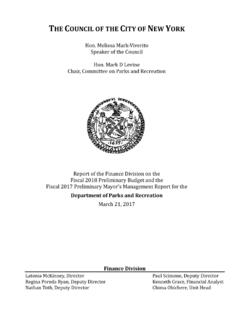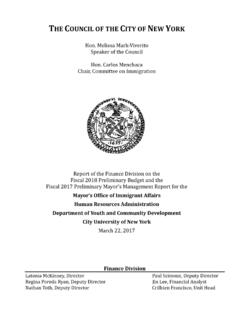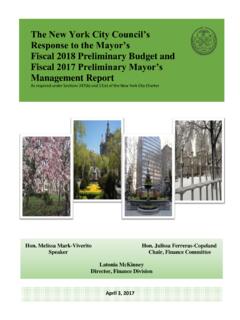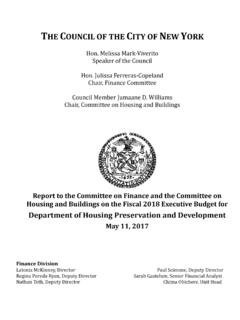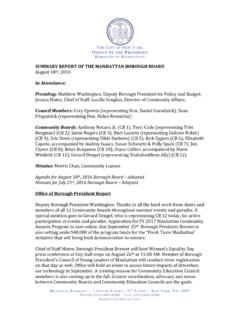Transcription of Community Board 12 -Manhattan Washington Heights & …
1 Community Board 12 - manhattan Washington Heights & Inwood 530 West 1661h St. 61h Floor, New York, NY 10032 Phone: (212) 568-8500, Fax: (212) 740-8197 Website: George Fernandez Jr. - Chairman Ebenezer Smith, District Manager Amended Dec 2, 2015 Hon. Carl Weisbrod, Director NYC Department of City Planning Equitable Life building Hon. David Quart Deputy Commissioner of Strategy, Research & Communications 120 Broadway 31s1 Fl. NYC Dept. of Housing Preservation & Dev. 100 Gold Street Rm 5-P1 New York, NY 10271 New York, NY 10038 Dear Director Weisbrod & Dep. Commissioner Quart: Please be advised that on Tuesday, November 24, 2015 at the General Meeting of manhattan Community Board 12 a resolution passed with a majority vote of (29) In Favor, (0), Opposed, and (0) Abstain of not supporting the Zoning Quality Affordability text Amendments for these reasons; The proposed ZQA and MIH zoning text amendments require further study and refinement before they are considered for implementation.
2 In its review to-date of ZQA and MIH the manhattan Borough President's office ("MBPO") has identified certain deficiencies in the proposed text amendments. For ZQA the deficiencies include: the "two-door''/"poor door'' option remains; loose provisions with respect to off-site affordable units; the FAR bonus does not take into account neighborhood character and is the same everywhere; double dipping is allowed with the 421-A program and there are inconsistent provisions for Community review. For MIH the deficiencies are: the absence of anti-harassment requirements; a loop-hole that allows BSA to waive affordable housing requirements; an undefined trigger for "substantial new residential density"; and lowering the unit threshold that applies to a special permit for the option of payment in lieu of providing affordable housing.
3 The MBPO also notes that ZQA and MIH do not address New York City Housing Authority developments, which house over 115,000 residents in manhattan alone; and Whereas: As part of the City of New York's coordinated efforts under Housing New York, Mayor de Blasio's five borough housing plan, the Department of City Planning ("DCP") is proposing a set of targeted zoning regulations to support the creation of new affordable housing and encourage better residential buildings. The targeted zoning regulations include Zoning for Quality and Affordability ("ZQA") and Mandatory lnclusionary Housing ("MIH"). ZQA seeks to advance numerous goals of Housing New York, including making the city more affordable to a wide range of New Yorkers, and fostering diverse, livable communities with buildings that contribute to the character and quality of neighborhoods.
4 It aims to address several ways in which current zoning, drafted a generation ago, has in practice discouraged the affordability and quality of recent buildings. MIH is a new proposal to use zoning to require permanent affordable housing when future DCP actions encourage substantial new housing. It would require, through zoning actions, a share of new housing to be permanently affordable. Affordable housing would be mandatory, not voluntary and would be a condition of residential development when developers build in an Whereas: Whereas: Whereas: Whereas area zoned for MIH, whether zoned as part of a City neighborhood plan or a private rezoning application; and The goals of ZQA include promoting senior housing, reducing parking requirements for affordable housing and modifying the contextual building envelope.
5 The goals of MIH include: promoting vibrant, diverse neighborhoods; ensuring affordable housing in areas in which DCP is planning for growth; meeting the needs of a range of low- and moderate income New Yorkers; ensuring that the MIH program meets legal standards, is applied consistently and supports the financial feasibility of housing creation; and The goals of ZQA and MIH are commendable, but these proposed text amendments will have broad, city wide impacts and do not consider how these impacts will affect individual neighborhoods. Further, DCP has afforded Community boards insufficient time to carefully and thoroughly review the proposed text amendments and to coordinate with the offices of their respective borough presidents, who are required to undertake their review of ZQA and MIH as the same time as the Community boards; and DCP introduced the ZQA and MIH text amendment proposals for public review on September 21, 2015.
6 Comments from Community boards and from borough presidents are due by November 30, 2015. DCP presented the ZQA and MIH proposals to the Land Use Committee ("Land Use" or the "Committee") of Community Board 12- manhattan at its November 4, 2015 meeting and also briefed the Committee on ZQA at its June 3, 2015 meeting. At the June 2015 briefing the Committee identified various concerns including: how affordable housing is defined and why nursing homes are included with affordable housing as opposed to healthcare facilities; the extent of communication and coordination between offices of New York City and New York State concerning New York State's long term plans for reducing the number of nursing home beds and how this reconciles with zoning changes that incentivize development of nursing homes; the analysis undertaken to support the recommendation to eliminate the parking requirement for new affordable housing developments.
7 The impact of eliminating the parking requirement for new affordable housing on on-street parking and traffic congestion; why the development of micro-units appears to be encouraged and incentivized; and the absence of consideration to specific neighborhood characteristics and planning needs. The Committee requested that these concerns be relayed to DCP senior management. The Committee did not receive any response from DCP prior to its November 2015 meeting and the presentation made by DCP in November 2015 did not reflect any modifications to the zoning text proposal that responded to the concerns raised by the Committee; and At the November 2015 presentation the following additional comments and concerns were raised with respect to ZQA and MIH.
8 1. The uniform application of the text amendments will have a disparate impact on low-income communitiesand will gradually promote displacement, decreased affordability and change neighborhood The zoning changes made under ZQA encourages, but does not require the design of buildings with moreinteresting, articulated facades which leaves open the possibility and likelihood that new buildingsconstructed will be larger, but not more architecturally attractive. 3. The area median income (AMI) levels that apply to affordable units should not be based on "an average"percentage of AMI but a "not to exceed" percentage of AMI, should be tied to the AMI of the communitydistrict in which a project is to be developed, and the rent/income levels of affordable units should be tiered and not allowed to be concentrated near the upper income/rent limit.
9 4. Community Boards should have a role in the MIH application review process and should be consulted onwhich AMI options best fits the needs of its There should be a 50% Community preference for units developed under the MIH and Affordable units developed under MIH and ZQA should be permanently included in the rent stabilizationsystem so that tenants are guaranteed lease renewals and rent increases are determined by the RentGuidelines Board . Whereas: Whereas: Be It Resolved: assumption that parking spaces contained within affordable housing developments are underused dueto unaffordable monthly fees is not supported with any documentation presented to the Committee,appears to be based on a limited sample of development projects that may be skewed towards low income senior housing, and must be subjected to further, more detailed, transparent and inclusive research.
10 Allows the Board of Standards and Appeals ("BSA") to waive the affordable housing requirements; thisdefeats the purpose of MIH and should be its review to-date of ZQA and MIH the manhattan Borough President's office ("MBPO") has identified certain deficiencies in the proposed text amendments. For ZQA the deficiencies include: the "two door"/"poor door" option remains; loose provisions with respect to off-site affordable units; the FAR bonus does not take into account neighborhood character and is the same everywhere; double-dipping is allowed with the 421-A program and there are inconsistent provisions for Community review. For MIH the deficiencies are: the absence of anti-harassment requirements; a loop-hole that allows BSA to waive affordable housing requirements; an undefined trigger for "substantial new residential density"; and lowering the unit threshold that applies to a special permit for the option of payment in lieu of providing affordable housing.


